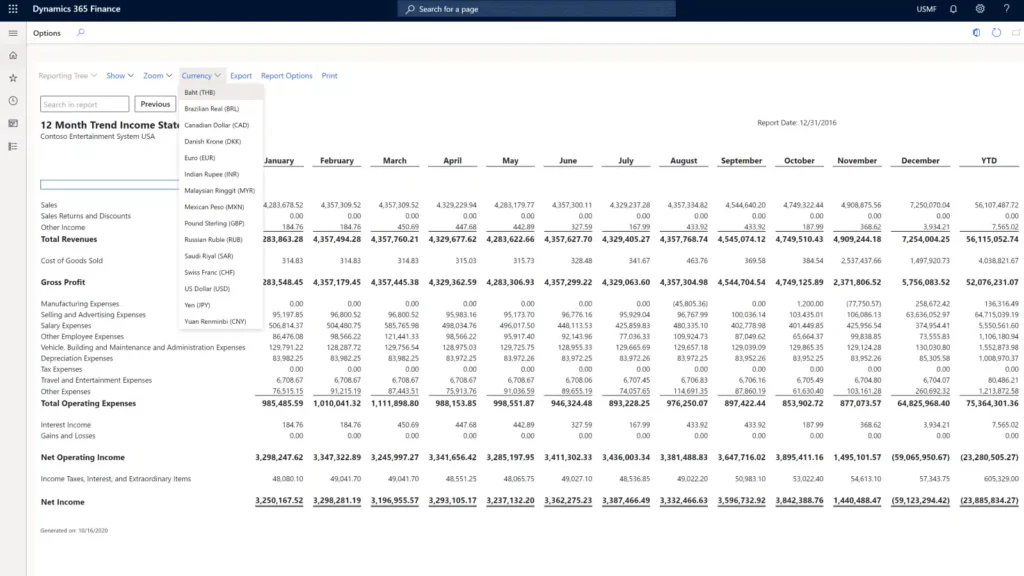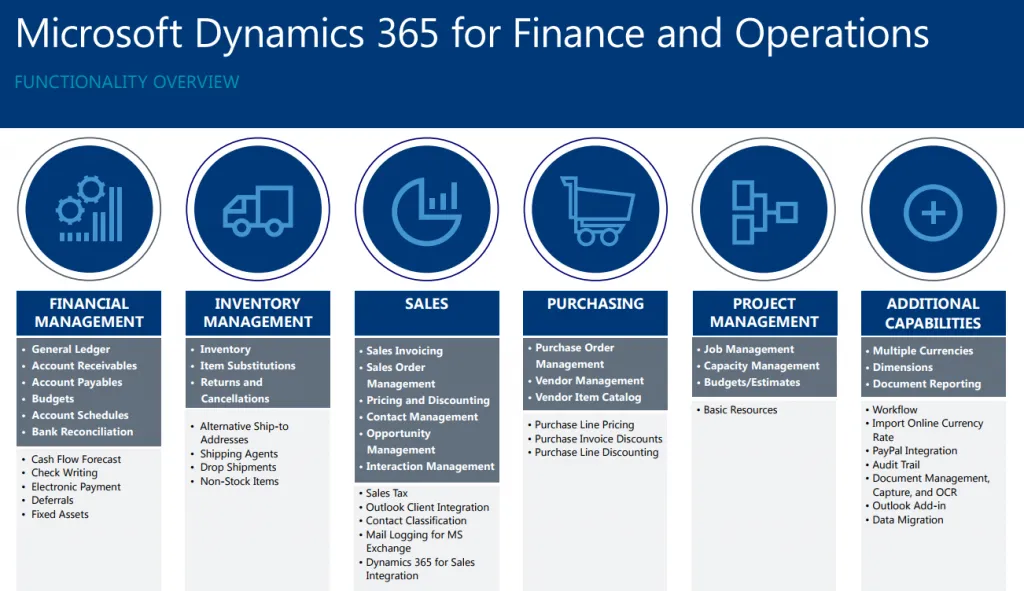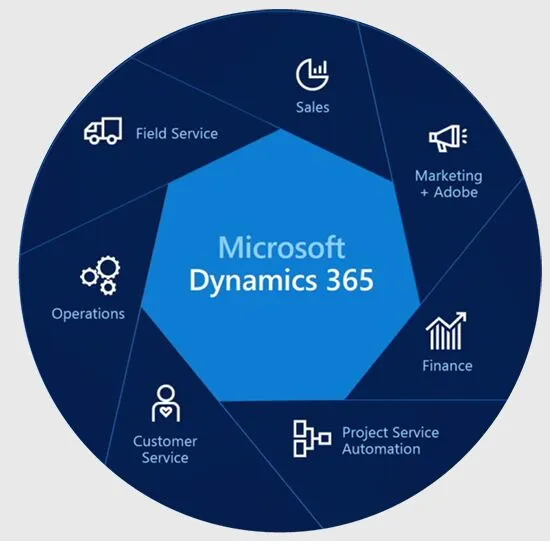Microsoft Dynamics 365 Finance & Operation Overview

Microsoft Dynamics 365 Finance & Operations (D365 F&O) is a robust, cloud-based enterprise resource planning (ERP) solution designed to help businesses manage their financials, operations, supply chain, and manufacturing processes efficiently. As businesses seek agile and scalable solutions to navigate complex global markets, Microsoft Dynamics 365 Finance & Operations stands out for its comprehensive features, integration capabilities, and ability to drive transformation through digital technology. Here’s an in-depth look at what makes Microsoft Dynamics 365 Finance & Operations a critical tool for modern enterprises.
Key Features of Microsoft Dynamics 365 Finance & Operation

Microsoft Dynamics 365 for Finance and Operations comes with a robust set of features covering various aspects of business operations. Here are some key features:
- Financial Management
Centralized Financial Operations: Microsoft Dynamics 365 Finance & Operation integrates core financial management functions such as general ledger, accounts payable, accounts receivable, and budgeting, providing real-time financial insights and analytics.
Global Financial Capabilities: It supports multiple currencies, languages, and legal entities, making it ideal for global operations, and facilitates compliance with international financial reporting standards.
- Supply Chain Management
Inventory Management: Advanced tools help manage inventory levels efficiently, reducing costs and improving customer satisfaction by ensuring the right products are available at the right time.
Warehouse Management: Automates warehouse processes to optimize space utilization and streamline operations, enhancing order fulfillment accuracy and efficiency.
- Project Management
Project Planning and Tracking: Enables precise management of projects with tools for budgeting, time and expense tracking, and project costing and billing.
Resource Management: Provides capabilities for scheduling resources based on project requirements, availability, and skills, ensuring optimal allocation of personnel and equipment.
- Manufacturing
Production Control: Helps plan, schedule, and execute production orders, while tracking the manufacturing processes and integrating with the supply chain.
Lean Manufacturing: Supports lean manufacturing practices aimed at minimizing waste and improving overall efficiency in the production process.
- Retail
Unified Commerce: Manages sales, service, and marketing across all channels, providing a consistent and effective customer experience both online and offline.
Merchandising: Assists in managing product information, categories, assortment, and pricing, streamlining product management across multiple locations and channels.
- Human Resources
Employee Management: Simplifies human resource processes by managing employee records, benefits, compensation, and compliance from a single interface.
Talent Acquisition and Development: Facilitates the recruitment, training, and development of employees, aiding in talent management and workforce optimization.
- Business Intelligence and Reporting
Embedded Analytics: Offers real-time business intelligence and reporting capabilities embedded within the application, powered by Microsoft Power BI.
Decision Support: Provides actionable insights to support decision-making, with extensive analytics tools that help monitor and optimize business performance.
- Regulatory Compliance
Automated Compliance Tools: Ensures businesses comply with legal and financial regulations applicable in different countries and regions.
Audit Trails: Keeps detailed records of financial transactions and changes within the system, aiding in audits and compliance checks.
- Integration and Scalability
Seamless Integration: Easily integrates with other Microsoft products like Office 365, Dynamics 365 for Sales, and Azure, providing a unified and scalable platform.
Cloud-based Solution: Offers flexibility and scalability with a cloud infrastructure, allowing businesses to adjust resources as needed and access the system from anywhere
Microsoft Dynamics 365 Finance and Operations Timeline
The evolution of Microsoft Dynamics 365 Finance and Operations, a part of the Dynamics 365 suite, has been marked by significant milestones and changes. Here’s a historical overview:
- IBM Axapta (1998): Collaboration between IBM and Damgaard Data, originated as a digital accounting software for business owners based on Concord AXL business processes.
- Axapta 2.5 (2000): Merger of Damgaard and Navision Software, renamed from NavisionDamgaard to Axapta 2.5. Introduced improvements in features, including an updated Project Module and a new Banking Module.
- Microsoft Axapta 3.0 (2002): Microsoft acquired NavisionDamgaard, and renamed Axapta to Microsoft Dynamics AX. Updates and enhanced capabilities – features such as support for 17 countries, an updated security model, new licensing plan were added.
- Microsoft Dynamics AX 4.0 (2006): Rebranded Microsoft Business Solutions to Microsoft Dynamics, Axapta renamed to AX. Features included a Service Management module, responsive user interface, standard Microsoft layout, and AD authentication.
- Microsoft Dynamics AX 2009 (2008): Released with features emphasizing low operational costs, data-driven decision-making, data reporting, global location support, and simplified operations management.
- Microsoft Dynamics AX 2012 (2011): Released with availability in 30+ countries and support for 25 international languages. Focused on medium and large-sized industries with cloud and on-premises deployment options.
- Microsoft Dynamics 365 AX7 (2016): Introduced a new user interface accessible through a browser. Cloud computing for flexible deployment options. Later rebranded as Dynamics 365 for Operations and further renamed Dynamics 365 for Finance and Operations.
- Microsoft Dynamics 365 for Finance and Operations (2017): Part of the complete ERP and CRM suite – Dynamics 365, offers cloud, on-premises, and hybrid deployment options. Utilizes advanced technologies such as artificial intelligence, business intelligence, and financial intelligence.
- Microsoft Dynamics 365 Finance/Supply Chain Management (2020): Split into two separate products: Microsoft Dynamics 365 Finance and Microsoft Dynamics 365 Supply Chain Management
Benefits for Businesses
Microsoft Dynamics 365 for Finance and Operations users should expect a vast array of benefits, provided the system is set up correctly (which can be helped by a team of D365 integration professionals). These include, but are not limited to:
- Reduced Operational Costs: Microsoft Dynamics 365 Finance and Operations play a crucial role in tracking and recording all organizational expenses. This comprehensive approach allows users to proactively reduce operational costs by efficiently evaluating operations and processes. Functions such as forecasting, strict budget planning, cost accounting, precise reporting, and data analytics are seamlessly integrated to minimize financial costs, ensuring optimal operational efficiency.
- Increased Profitability: The advanced capabilities of Microsoft Dynamics 365 Finance & Operations contribute to reducing the complexity of financial and operational tasks, ultimately maximizing profitability. By adopting the latest technologies, the application supports various international currencies, enabling organizations to expand globally while adhering to government regulations for international scalability.
- Better Accounting Decisions: Microsoft Dynamics 365 Finance & Operations leverages the power of AI and machine learning to simplify decision-making processes; advanced technologies help generate accurate and detailed reports, provide real-time data insights, streamline financial reporting, support multiple currencies, enhance cash flow management, and more.
- Unified Financial Data: Microsoft Dynamics 365 Finance & Operations unifies the entire dataset, offering approved users access whenever needed. Customized workspaces, seamless integrations, real-time data insights, and prioritized task scheduling contribute to increased productivity.
What Industries Use Dynamics 365 Finance And Operations?

Microsoft Dynamics 365 Finance & Operations is a very versatile solution – it finds great use across dozens of industries, from online stores to large industrial corporations. Predominantly, we see the module being used in the following spheres:
- Manufacturing: Manages the entire manufacturing process, providing full visibility for real-time, data-driven decision-making.
- Construction: Provides proactive control over operations, managing multiple locations simultaneously, integrating systems, and maximizing growth and profitability.
- Architecture & Engineering: Streamlines complex processes and operations in architecture and engineering, utilizing automation and business intelligence for effective management.
- Retail: Flawlessly manages the chain of stores, centralizing data from different outlets for efficient and connected operations.
- E-commerce: Handles a large number of daily orders with accuracy and data insights, ensuring timely processing and accurate reporting.
- Field Service: Manages parameters such as profitability, service management, task scheduling, billable hours, and resource utilization, offering a transparent and visible overview.
- Distribution: Offers features and capabilities to support distribution industries, with the option to access Dynamics 365 for Supply Chain for specific solutions in distribution and supply chain management.
Dynamics 365 Finance vs Dynamics 365 Supply Chain Management
Dynamics 365 Finance & Operations consists of two applications: Dynamics 365 Finance and Dynamics 365 Supply Chain Management. Dynamics 365 Finance is a robust financial management application for medium to large organizations that simplifies and modernizes business processes. It makes use of rich AI capabilities and process automation to drive greater efficiencies, innovation, and growth. Dynamics 365 Supply Chain Management is an intelligent solution that automates and optimizes all aspects of the supply chain from production to transportation through AI, machine learning, and mixed reality. With end-to-end visibility of your warehouse operations and inventory, it enables businesses to predict future outcomes, reduce costs, and increase product quality. Each application can be used individually or used simultaneously for a comprehensive ERP system.
What are the Other Microsoft Dynamics 365 Finance & Operations Modules?
The Microsoft Dynamics suite isn’t limited to just D365 Finance and Operations – there are many more useful modules, with each of them offering a distinct set of features. In this section, we’ll go over the 4 most commonly used ones:
- Dynamics 365 Human Resources
- Dynamics 365 Customer Service
- Dynamics 365 Sales
- Dynamics 365 Marketing
For more information on these modules as well as overviews of other business-critical D365 modules, read our Microsoft Dynamics 365 Modules guide.
Dynamics 365 Human Resources
Dynamics 365 Human Resources is an HR management module that helps organizations streamline their human capital management processes. It includes features for talent acquisition, employee onboarding, benefits administration, payroll, performance management, and workforce analytics.
- Employee Lifecycle Management: Dynamics 365 Human Resources streamlines the entire employee lifecycle, from recruitment and onboarding to performance management and offboarding.
- Talent Acquisition and Development: It incorporates AI-driven insights to identify top talent and offers comprehensive employee development features, including training programs and performance evaluations.
- Workforce Planning and Analytics: AI-driven analytics provide actionable insights into workforce trends, allowing HR professionals to make informed decisions about staffing, skills development, and resource allocation.
- Employee Self-Service and Collaboration: To enhance employee experience, this module includes self-service features that empower employees to manage their HR-related tasks independently.
Dynamics 365 Customer Service
Dynamics 365 Customer Service is a customer relationship management (CRM) module focused on delivering excellent customer support. It provides tools for case management, a knowledge base, self-service options, and omni-channel communication, allowing organizations to resolve customer issues and deliver a consistent service experience efficiently.
- Omnichannel Customer Engagement: Dynamics 365 Customer Service delivers a seamless omnichannel experience, allowing organizations to engage with customers across various touchpoints.
- Case Management and Resolution: Efficient case management is a key focus, enabling customer service agents to track, prioritize, and resolve customer issues effectively.
- Knowledge Management: Dynamics 365 Customer Service includes knowledge management features that centralize information, FAQs, and troubleshooting guides. AI-driven suggestions help agents access relevant information quickly, enhancing customer support capabilities.
- Service Analytics and Continuous Improvement: This module provides in-depth analytics on service performance, customer satisfaction, and agent efficiency.
Dynamics 365 Sales
Dynamics 365 Sales is a CRM module designed to empower sales teams with tools for lead management, opportunity tracking, and relationship management. It includes features for sales forecasting, territory management, and sales analytics.
- Sales Force Automation: Dynamics 365 Sales automates and streamlines sales processes, from lead generation to deal closure. It provides a unified platform for managing customer interactions, sales pipelines, and forecasting, enabling sales teams to focus on building meaningful customer relationships.
- Relationship Intelligence: The module leverages AI-driven relationship intelligence to provide actionable insights into customer behavior and preferences. It assists sales professionals in understanding customer needs, anticipating opportunities, and personalizing their approach for enhanced engagement.
- Sales Performance and Analytics: Analytics features enable sales teams to track and analyze key performance metrics.
- Integration with Productivity Tools: Sales professionals can access customer data, communications, and relevant documents directly within familiar applications like Outlook and Teams.
Dynamics 365 Marketing
Dynamics 365 Marketing is a module focused on marketing automation and campaign management. It includes features for creating and managing marketing campaigns, lead scoring, customer segmentation, and analytics.
- Customer Journey Orchestration: Dynamics 365 Marketing includes intuitive tools for creating targeted campaigns, email marketing, and customer segmentation, ensuring a tailored and engaging customer experience.
- Lead Management and Scoring: Efficient lead management is central to the module, offering tools for lead qualification, scoring, and nurturing. AI-driven lead scoring helps prioritize leads based on their likelihood to convert, enabling sales teams to focus on high-potential opportunities.
- Multichannel Campaign Execution: Dynamics 365 Marketing supports multichannel campaign execution, allowing organizations to reach customers through various channels, including email, social media, events, and webinars.
- Marketing Analytics and ROI Measurement: Analytics features enable marketers to assess the effectiveness of their campaigns and measure return on investment (ROI).
Microsoft Dynamics 365 Finance and Operations Pricing
To provide a clear overview of the pricing structure for Microsoft Dynamics 365 Finance and Dynamics 365 Supply Chain Management, I’ve formatted the information into a simplified table. This should help clarify the costs associated with different types of licenses and services under these applications:
Dynamics 365 Finance Pricing Table
| License Type | Function | Monthly Cost (Approx.) |
| Full User License | Access to full finance functionalities | $180 per user |
| Team Members License | Limited access for basic tasks | $8 – $20 per user |
| Additional Environment | Extra environments for testing, etc. | Variable |
Dynamics 365 Supply Chain Management Pricing Table
| License Type | Function | Monthly Cost (Approx.) |
| Full User License | Access to full supply chain functionalities | $180 per user |
| Team Members License | Limited access for basic tasks | $8 – $20 per user |
| Additional Environment | Extra environments for testing, etc. | Variable |
Additional Costs
| Service Type | Description | Cost |
| Customizations and Add-ons | Specific customizations and third-party add-ons | Variable |
| Support Plans | Enhanced support options | Variable (based on plan) |
Conclusion
Microsoft Dynamics 365 Finance & Operation is a powerful ERP solution that empowers businesses to streamline their financial and operational processes, improve efficiency, and drive growth. Its comprehensive features, scalability, and integration capabilities make it an ideal choice for organizations looking to enhance their business operations.